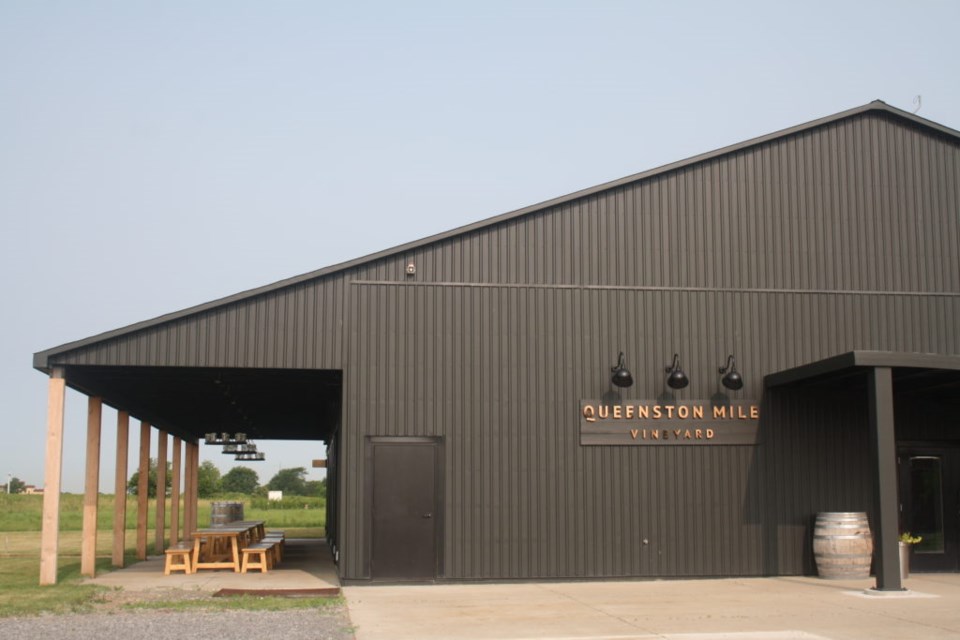
Despite strong opposition from neighbours and some business owners, Queenston Mile received its first rezoning approval to move from a farm winery to an estate winery Monday, during the Town’s committee-of-the-whole meeting.
The main difference for the small winery on about 50 acres of vineyards will be that it can hold special events in a hospitality area and offer food.
One of the sticking points with neighbours has been the noise that would be disruptive during events.
Lawyer Tom Richardson spoke at the committee meeting to persuade councillors to either defer the rezoning decision for a year, allowing it a season of producing wine onsite as a farm winery, or to turn it down.
He said it is not now operating as a farm winery, showing a photograph of a sit-down meal for visitors on the patio at Queenston Mile, with the chef from Creekside Winery at work in the kitchen.
Richardson also maintained no wine has been made onsite, also showing there isn’t equipment to make wine and bottle it onsite, as required of a farm or estate winery.
There have been several attempts to discredit the winery owner and manager for trying to disguise their true purpose of operating a restaurant. But representatives of the winery have maintained they want a commercial kitchen to serve food, but have no intention of operating a restaurant.
Even the councillors who supported rezoning for an estate winery were hesitant to do so, given some of the past actions of the owners, including renovating a barn without a building permit.
“I spent a lot of time on this trying to understand what’s going on,” said Coun. Allan Bisback who went on to explain he would support the rezoning recommendations from town staff based on planning elements alone.
However, he added, “if this is approved there needs to be some work done with neighbours.”
Coun. Gary Burroughs said he couldn’t support the rezoning, because he doesn’t accept the Region’s report saying the current septic facility onsite is sufficient.
The system will not be sufficient to handle wastewater from wine production, councillors were told, but the Region is okay with the wastewater being trucked offsite.
Rick Wilson, the Town’s manager of planning, said the Region is responsible for septic review and approval, and the Town has received “repeated information” that the Region is satisfied the septic system is adequate for the accepted uses of the winery.
“Waste can be trucked away,” said Coun. Erwin Wiens. “It’s done all the time. It gets put in a holding tank and is trucked away. That’s common practice.”
Although he supported the rezoning because he believes the property is a good site for a winery, he said he did so “with a heavy heart. There were rules that weren’t followed.”
He said the applicants put council in a difficult place by not following the proper process. “Neighbours have a right to come after me if the rules aren’t followed” in the future, he added.
“Rules have been stretched to the limits, to say the least,” agreed Coun. Norm Arsenault, issuing a warning to the applicants: “make sure you play by the rules.”
“Here’s the thing that really bothers me,” said Lord Mayor Betty Disero. “They took an old barn, renovated it without a permit, and now they want to be an estate winery.”
She said the applicants may have received bad advice, but they are putting an event venue 50 feet from neighbours’ backyards.
There are other more appropriate locations on the property, where no grape vines are planted, she pointed out. “Move the estate winery where it should be.”
She said she’s not anti-wineries or anti-farming — she couldn’t support the rezoning because of the building’s proximity to neighbouring residents.
After a lengthy discussion at an August council meeting, the rezoning was deferred to September to have town planners look at a few issues: removal of the commercial kitchen space; a comprehensive plan for buffering; the possibility of removing the entrance onto Queenston Road; reviewing and reporting on the feasibility of an entrance on Concession 6; and removing the flexibility of the space designated for hospitality and wine production.
But town staff stuck to the original report and recommendations, saying the pairing of food and wine is standard in the wine industry, and winery and kitchen facilities are small scale and “generally supported by provincial, regional and town planning policies.”
The report said any buffering for neighbours would come at the site plan stage; town staff will look at the driveway issue but aren’t recommending the removal of the Queenston Road entrance; staff will look at a driveway from Concession 6; and they don’t recommend the removal of flex space that will allow for wine production. In answer to the final question, regarding the septic system, the report said, “regional staff has recently confirmed that the existing septic system can accommodate the uses proposed through the rezoning based on updated sewage flow information from the applicant’s consultant.”
Councillors sitting as committee-of-the-whole approved the staff recommendations, and will vote to ratify it next Monday.